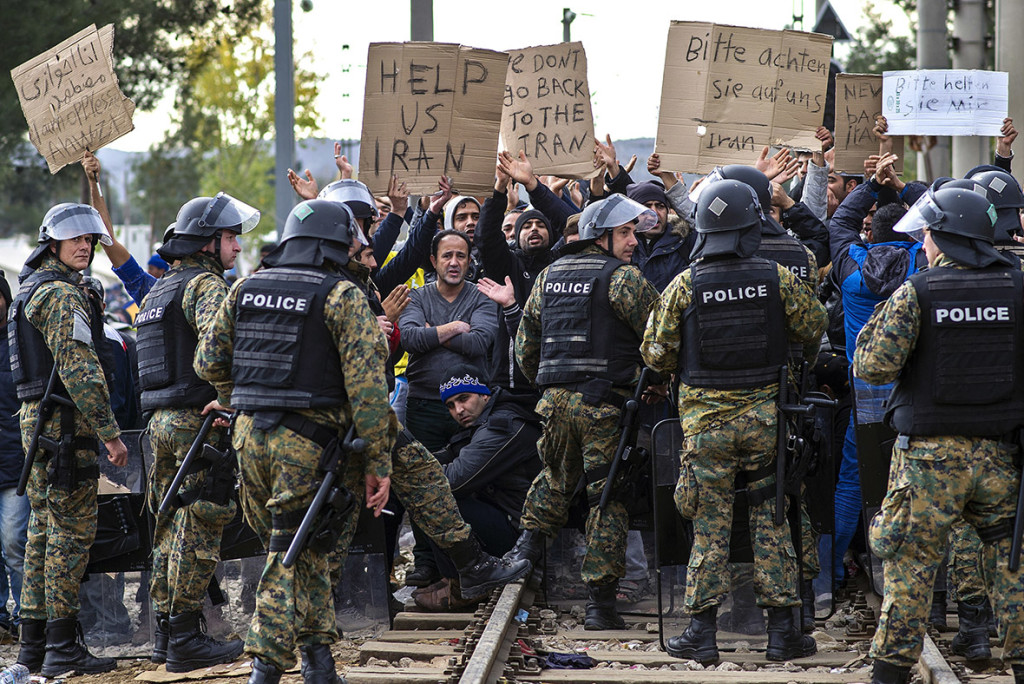November 27-2015
by Warren L. Nelson

Four countries in the Balkans have shut their doors to Iranians and refugees from all other countries that have not dissolved into chaos.
Serbia, Croatia, Macedonia and Slovenia all announced last Thursday that they will only allow refugees from Syria, Iraq and Afghanistan to cross their borders. They concluded those nationalities had legitimate refugee status because of the disorderly state of their countries. (Croatia is also accepting Palestinians, according to news reports.)
But other refugees, such as those from Iran, are being rejected as economic refugees—people seeking a better life, but not fleeing threats to their lives.
The sudden action closed the gates at 8 a.m. last Thursday at Idomeni on the Greek-Macedonian border. Just after the closure, the Associated Press said 300 people, mostly from Iran, arrived at the gate seeking to pass into Macedonia and were blocked.
Melita Sunjic, the spokeswoman for the UN High Commissioner for Refugees (UNHCR) in Serbia, said, “They are stuck on a no-man’s land.”
No one has any idea how many Iranians are now trapped in the Balkans. But many of the trapped refugees soon began protesting at the Greece-Macedonia border. One Iranian sewed his lips shut, a form of protest that Iranians who have been rejected in many countries around the world have resorted to over the last few decades. As of Monday, six Iranians had adopted this protest, which adds some drama to the traditional hunger strike.
The first man to sew his lips shut identified himself only as Hamid, 34, an electrical engineer. Asked by Reuters where he wanted to go, Hamid said, “To any free country in the world. I cannot go back. I will be hanged.”
Rights groups have questioned the policy of separating out nationalities, saying asylum must be granted on individual merit, not on the basis of nationality.
“To classify a whole nation as economic migrants is not a principle recognized in international law,” said Rados Djurovic, director of the Belgrade-based Asylum Protection Center. “We risk violating human rights and asylum law,” he told Serbian state television.
On the Macedonian-Greek border, crowds of Iranians, Moroccans, Bangladeshis and a scattering of other nationalities blocked the railway line linking the two countries, halting at least one train that tried to cross, a Reuters photographer said.
A group of Iranians erected a banner proclaiming a hunger strike. “We are people, too,” said an Iranian who gave his name as Ahmed. “We are not terrorists, just ordinary people searching for a better life. We crossed thousands of miles. For what? To be stuck here?”
A group of Bangladeshis stripped to the waist and wrote slogans on their chests in red paint. “Shoot us, we never go back,” read one. “Shoot us or save us,” read another.
Meanwhile, temperatures fell below freezing in some parts of Europe and the first snow fell, prompting fears of death by exposure for refugees caught in the open.
The initial decision to accept only Syrians, Iraqis and Afghans was made by the government of Slovenia. Within hours, the other three countries to the south of Slovenia adopted the same policy, apparently in fear that they would otherwise be stuck with all the other nationalities. That had the practical effect of trapping all the other nationalities in Greece, perhaps the European country least capable of dealing with them because of its economic travails.
The fear of Muslim refugees has grown exponentially in recent days as investigators said two of the men implicated in the Paris killings had made the trip through the Balkans in the weeks just before the Paris attacks.






















